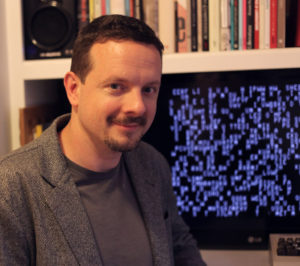
Nick Montfort develops computational art and poetry, often collaboratively. He is on the faculty at MIT and is the principal of the naming firm Nomnym. He earned a Ph.D. in computer and information science from the University of Pennsylvania, a Masters in creative writing (poetry) from Boston University, a Masters in media arts and sciences from MIT, and undergraduate degrees in liberal arts and computer science from the University of Texas.
Projects of Montfort’s include several very small-scale poetry generators including the ppg256 series and Concrete Perl; the group blog Grand Text Auto; Ream, a 500-page poem written in one day; Mystery House Taken Over, a collaborative “occupation” of a classic game; Implementation, a co-written novel on stickers documented in a book; the interactive fictions Winchester’s Nightmare, Ad Verbum, and Book and Volume; and several other work of digital poetry and art, including the collaborations Sea and Spar Between (with Stephanie Strickland) and The Deletionist (with Amaranth Borsuk and Jesper Juul). He works in several different contexts, which include the Web, book publication, and the literary reading but also the demoscene (e.g., the collaboration Nanowatt, shown at Récursion in Montréal) and gallery exhibition (e.g, From the Tables of My Memorie, exhibited in Boston and Singapore and the collaborative Boston exhibit Programs at an Exhibition). He translates computational art and writing and organizing the translation project Renderings; his own work has been translated into half a dozen languages. For instance, his free-software computer-generated novel World Clock was translated to Polish and published in ha!art’s Liberatura series, which also includes Finnegans Wake. Many of Montfort’s works have also been modified and transformed by others to become the basis for new work; his short generator Taroko Gorge has been the basis for more than two dozen published remixes.
Montfort has presented, done readings, had screenings, or exhibited his work beyond the United States in Australia, Austria, Brazil, Canada, Finland, France, Germany, Greece, Mexico, Norway, Poland, Russia, Singapore, Slovakia, Spain, Taiwan, and the United Kingdom.
Montfort has helped to establish several new academic fields: Platform studies (he initiated this field and the corresponding MIT Press book series with Ian Bogost), critical code studies (he organized and co-authored the main book using this approach), and electronic literature (he wrote the first book focusing on a single form of e-lit, has extensively created, edited, and written about work of this sort, and served on the board of directors of the Electronic Literature Organization for more than ten years). He founded and directs The Trope Tank, a DIY and boundary-transgressing MIT research lab that undertakes scholarly and aesthetic projects and offers material computing resources.
#! (Counterpath, 2014; the title is pronounced “shebang”) is Montfort’s latest book, and contains programs and poems. 10 PRINT CHR$(205.5+RND(1)); : GOTO 10, (MIT Press, 2013), a 10-author single-voice publication that he organized, focuses on a one-line Commodore 64 BASIC program. He wrote Riddle & Bind (Spineless Books, 2010), a book of literary riddles and constrained poems. With Ian Bogost, he wrote Racing the Beam: The Atari Video Computer System (MIT Press, 2009). He wrote Twisty Little Passages: An Approach to Interactive Fiction (MIT Press, 2003), and, with William Gillespie, 2002: A Palindrome Story (Spineless Books, 2002), which the Oulipo acknowledged as the world’s longest literary palindrome. He also edited The Electronic Literature Collection Volume 1 (with N. Katherine Hayles, Stephanie Strickland, and Scott Rettberg, ELO, 2006) and The New Media Reader (with Noah Wardrip-Fruin, MIT Press, 2003). In 2016 Montfort’s Exploratory Programming for the Arts and Humanities (MIT Press), which continues his long-term project to teach programming as a method of culturally engaged inquiry and making, will be published. Also coming in 2016 is 2×6 (Les Figues), a book of computer-generated poems done in collaboration with six others, in English and five other languages.
